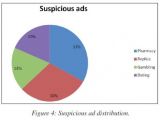Of the myriad of scams running on Facebook, some stand out not just because of the number of users they entrapped but also because crooks tended to resort to them on a more frequent basis.
By far, the most popular was the one promising the unsuspecting user the possibility to learn the identity of whoever takes a gander at their profile. In some cases, the scam ended up with serving malware that could post on behalf of the profile owner and upload personal information to the attacker’s server.
Downloading a Trojan is many times the end goal
According to Bitdefender, another theme used by the scammers on Facebook throughout 2014 promised to show naked videos of friends of the recipient. It also delivered a Trojan, that posed as an update for Adobe’s Flash Player.
Coming in third place is a fraud attempt run through Facebook’s ad system. Crooks would take advantage of the platform to push cheap pharmaceuticals, designer replicas, and other counterfeit products.
Crooks take advantage of current scandals
Violence and amusement came up pretty often in reports on Facebook scams, luring the user with gruesome baits or with video thumbs claiming to be from footage showing funny situations.
In many cases, the end goal was to make the user install malware or to lead them to online surveys that purportedly acted as a hurdle for reaching the content.
In October, the crooks took advantage of the celeb hack scandal and baited with a video allegedly showing British actress Emma Watson in compromising stances.
It is recommended that Facebook users exercise caution when they receive offers that are too good to be true, or are promised content that is not verified on reputable media outlets.
Giveaway campaigns for high-value products
With the holiday season in full swing, crooks started to create Facebook pages allegedly promoting raffles for high-value products.
In one instance, they would seek to deceive users into liking such a page, commenting on it and sharing it with others, for a chance to win an Audi R8 sports car. In another, they offered Samsung 4k Ultra HD Curved TVs asking for the same input from the users.
These pages amassed hundreds of thousands of likes, increasing the value of the page. The end goal here was “like-farming,” a business that consists in gathering the appreciation of a large number of users; once a certain number is reached, the crooks sell the pages, complete with the data from the users.

 14 DAY TRIAL //
14 DAY TRIAL // 



